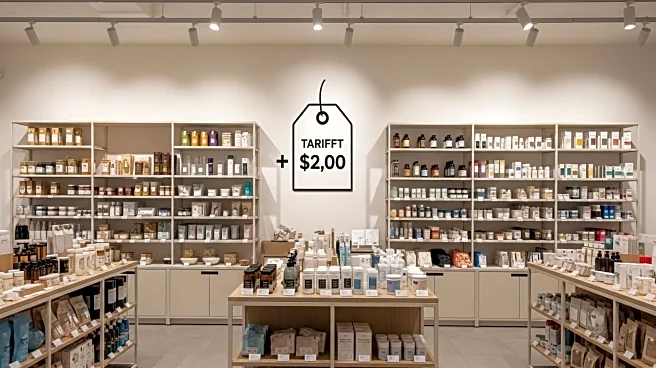What's Happening?
Retailers in the United States are facing significant challenges due to evolving tariff policies under the Trump administration. These tariffs have led to increased costs for retailers, particularly in the apparel and department store sectors, causing them to rethink sourcing strategies and adjust inventory orders. Companies like Walmart and On have managed to thrive despite these challenges, while others such as Under Armour and Funko have struggled. The tariffs have resulted in higher prices for consumers, with two-thirds noticing increased grocery costs and over 40% seeing more expensive clothing. As the holiday season approaches, retailers are bracing for further impacts, with toy prices rising and consumers considering debt to afford gifts. Retailers have been proactive, pulling forward inventory shipments to mitigate tariff effects, but the industry remains under strain.
Why It's Important?
The impact of tariffs on retailers is significant, affecting both consumer spending and business operations. As tariffs increase costs, retailers are forced to pass these costs onto consumers, potentially reducing consumer spending and affecting economic growth. The holiday season, a critical period for retail sales, may see reduced consumer spending due to higher prices, impacting retailers' revenues. Additionally, the tariffs are prompting retailers to diversify their supply chains, which could lead to long-term shifts in global production strategies. The broader economic implications include potential slowdowns in consumer sentiment and spending, which could affect the overall U.S. economy.
What's Next?
Retailers are expected to continue adjusting their strategies to cope with tariff impacts. This includes diversifying supply chains and utilizing technology to enhance purchasing decisions. As tariffs evolve, retailers will need to remain agile, potentially shifting production to countries less affected by tariffs. The holiday season will be a critical test of these strategies, with retailers closely monitoring consumer spending patterns. The ongoing geopolitical tensions and trade policy changes will likely continue to influence retail strategies and consumer behavior.
Beyond the Headlines
The tariff situation highlights broader issues in international trade and economic policy. The reliance on tariffs as a trade tool can lead to unintended consequences, such as increased consumer costs and strained international relations. The retail industry's response, including supply chain diversification and technological adoption, may set precedents for other sectors facing similar challenges. Additionally, the focus on tariffs underscores the importance of stable trade policies for economic growth and consumer confidence.










